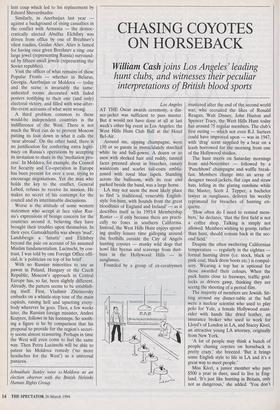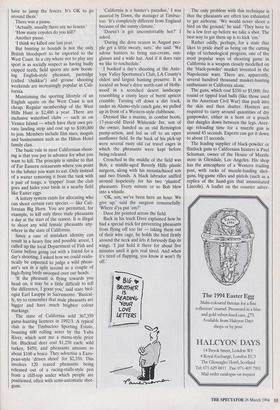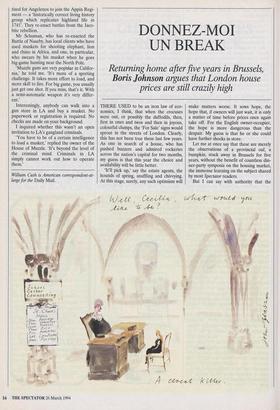CHASING COYOTES ON HORSEBACK
William Cash joins Los Angeles' leading
hunt clubs, and witnesses their peculiar interpretations of British blood sports
Los Angeles AT THE Oscar awards ceremony, a din- ner-jacket was sufficient to pass muster. But it would not have done at all at last week's other big event in Los Angeles: the West Hills Hunt Club Ball at the Hotel Bel-Air.
Around me, sipping champagne, were 150 or so guests in immathlately starched white tie and ball-gowns. A dozen or so men with sleeked hair and ruddy, tanned faces preened about in breeches, canary waistcoats and scarlet tail-coats embla- zoned with royal blue lapels. Standing across the ballroom, with its rear end parked beside the band, was a large horse.
LA may not seem the most likely place to find 'a traditional, venerable English- style fox-hunt, with hounds from the great bloodlines of England and Ireland' — as it describes itself in its 1993/4 Membership Roster — if only because there are practi- cally no foxes in southern California. Instead, the West Hills Hunt enjoys spend- ing quality leisure time galloping around the foothills outside the City of Angels hunting coyotes — manky wild dogs that howl like hyenas and scavenge from dust- bins in the Hollywood Hills — in sunglasses.
Founded by a group of ex-cavalrymen mustered after the end of the second world war, who recruited the likes of Ronald Reagan, Walt Disney, John Huston and Spencer Tracy, the West Hills Hunt today has around 75 regular members. The club's first outing — which not even R.J. Surtees could have improved upon — was in 1947, with 'drag' scent supplied by a bear on a leash borrowed for the morning from one of the Hollywood studios.
The hunt meets on Saturday mornings from mid-November — followed by a 'Punchbowl' champagne and waffle break- fast. Members change into an array of designer tweed-jackets, flat caps and straw hats, lolling in the glaring sunshine while the Master, Scott J. Tepper, a bachelor lawyer in sunglasses, delivers his weekly reprimand for breaches of hunting eti- quette.
'How often do I need to remind mem- bers,' he declares, 'that the first field is not a coffee shop. Talking is simply not allowed. Members wishing to gossip, rather than hunt, should remain back in the sec- ond field.'
Despite the often sweltering Californian temperature — regularly in the eighties — formal hunting dress (i.e. stock, black or pink coat, black dress boots etc.) is compul- sory. Wearing a top hat is optional for those awarded their colours. When the pack hunts close to freeways, traffic grid- locks as drivers gawp, thinking they are seeing the shooting of a period film.
The majority of members are Jewish. Sit- ting around my dinner-table at the ball were a nuclear scientist who used to play polo for Yale, a female Hollywood stunt- rider with hands like dried leather, an insurance broker who used to work for Lloyd's of London in LA, and Stacey Kivel, an attractive young LA attorney, originally from New York.
'A lot of people may think a bunch of people chasing coyotes on horseback is pretty crazy,' she breezed. 'But it brings some English style to life in LA and it's a great way to meet people.'
Miss Kivel, a junior member who pays $500 a year in dues, used to live in Eng- land. 'It's just like hunting in Britain, only not as dangerous,' she added. 'You don't have to jump the fences. It's OK to go around them.'
There was a pause.
'Actually, usually there are no fences.' 'How many coyotes do you kill?'
Another pause.
'I think we killed one last year.'
But hunting to hounds is not the only British bloodsport to be exported to the West Coast. In a city where not to play any sport is as socially suspect as having badly capped teeth, field sports are now boom- ing. English-style pheasant, partridge (called `chukkar') and grouse shooting weekends are increasingly popular in Cali- fornia.
Maintaining the sporting lifestyle of an English squire on the West Coast is not cheap. Regular membership of the West Hills Hunt is $2,400 a year. There are exclusive waterfowl clubs — such as on Venice Island — which have their own pri- vate landing strip and cost up to $100,000 to join. Members include film stars, moguls and businessmen such as the Hilton Hotel family clan. The basic rule in most Californian shoot- ing is that you pay in advance for what you want to kill. The principle is similar to that of Far Eastern restaurants where you point to the lobster you want to eat. Only instead of a waiter removing it from the tank with a pair of tongs, a 'trapper' from the club goes and hides your birds in a nearby field like Easter eggs. A lottery system exists for allocating who can shoot certain rare species — like Cali- fornian Big Horn. You are permitted, for example, to kill only three male pheasants a day at the start of the season. It is illegal to shoot any wild female pheasants any- where in the state of California.
Since a case of mistaken identity can result in a heavy fine and possible arrest, I called up the local Department of Fish and Game before going out with a friend for a day's shooting. I asked how we could realis- tically be expected to judge a wild pheas- ant's sex in a split second as a couple of high-flying birds swooped over our heads.
`If the pheasant is flying towards you head on, it may be a little difficult to tell the difference, I grant you,' said state biol- ogist Earl Lauppe in Sacramento. 'Basical- ly, try to remember that male pheasants are bigger and have much brighter colour markings.'
The state of California sold 367,350 game-hunting licences in 1992/3. A typical club is the Timbuctoo Sporting Estate, boasting 600 rolling acres by the Yuba River, which sent me a menu-style price list. Blacktail deer cost $1,250 each; wild turkey, $450; and pheasants amount to about $100 a brace. They advertise a Euro- pean-style 'driven shoot' for $2,350. This involves 120 reared pheasants being released out of a racing-stalls-style pen from a cliff-top under which people are positioned, often with semi-automatic shot- guns. 'California is a hunter's paradise,' I was assured by Dawn, the manager at Timbuc- too. 'It's completely different from England because of the sunny climate.'
'Doesn't it get uncomfortably hot?' I asked.
'During the dove season in August peo- ple get a little sweaty, sure,' she said. 'We advise hunters to bring sun-cream, sun- glasses and a wide hat. And if it does rain we like to reschedule.'
I booked a day's shooting at the Ante- lope Valley Sportsmen's Club, LA County's oldest and largest hunting preserve. It is located an hour's drive north-east of Holly- wood in a scorched desert landscape resembling a crusty layer of burnt apricot crumble. Turning off down a dirt track, under an Alamo-style ranch gate, we pulled up in front of a Western-style clubhouse.
Dressed like a marine, in combat boots, 17-year-old David Whiteside Jnr, son of the owner, handed us an old Remington pump-action, and led us off to an open sunflower field. In the back of his pick-up were several rusty old cat travel cages in which the pheasants were kept before being released.
Crouched in the middle of the field was Bob, a middle-aged Beverly Hills plastic surgeon, along with his moustachioed son and two friends. A black labrador sniffed around hopelessly for his two 'planted' pheasants. Every minute or so Bob blew into a whistle.
'OK, son, we've been here an hour. We give up,' said the surgeon remorsefully. 'Where d'ya put 'em?'
Dave Jnr pointed across the field.
Back in his truck Dave explained how he had a special trick for preventing pheasants from flying off too far — taking them out of their wire cage, he holds the bird firmly around the neck and lets it furiously flap its wings. 'I just hold it there for about five minutes until it gets real tired. And when it's tired of flapping, you know it won't fly off.' The only problem with this technique is that the pheasants are often too exhausted to get airborne. 'We would never shoot a bird on the ground,' he said. 'They have to be a few feet up before we take a shot. The best way to get them up is to kick 'em.'
Rather oddly, perhaps, for a state that likes to pride itself as being on the cutting edge of technological progress, one of the most popular ways of shooting game in California is a weapon closely modelled on the `black-powder' musket invented in the Napoleonic wars. There are, apparently, several hundred thousand musket-hunting enthusiasts in California alone.
The guns, which cost $350 to $5,000, fire round or tipped lead balls (like those used in the American Civil War) that push into the skin and then shatter. Hunters are required to carry around quantities of dry gunpowder, either in a horn or a pouch that dangles down between the legs. Aver- age reloading time for a muzzle gun is around 45 seconds. Experts can get it down to about 15 seconds.
The leading supplier of black-powder or flintlock guns to Californian hunters is Paul Schuman, owner of the House of Muzzle store in Glendale, Los Angeles. His shop has the atmosphere of a Western trading post, with racks of muzzle-loading shot- guns, big-game rifles and pistols (such as a replica of the hand-gun that assassinated Lincoln). A leaflet on the counter adver-
tised for Angelenos to join the Appin Regi- ment — a 'historically correct living history group which replicates highland life in 1745'. They re-enact battles from the Jaco- bite rebellion.
Mr Schuman, who has re-enacted the Battle of Naseby, has local clients who have used muskets for shooting elephant, lion and rhino in Africa, and one, in particular, who swears by his musket when he goes big-game hunting near the North Pole.
'Muzzle guns are very poplar in Califor- nia,' he told me. 'It's more of a sporting challenge. It takes more effort to load, and more skill to fire. For big game, you usually just get one shot. If you miss, that's it. With a semi-automatic weapon it's very differ- ent.'
Interestingly, anybody can walk into a gun store in LA and buy a musket. No paperwork or registration is required. No checks are made on your background.
I inquired whether this wasn't an open invitation to LA's gangland criminals.
'You have to be of a certain intelligence to load a musket,' replied the owner of the House of Muzzle. 'It's beyond the level of the criminal mind. Criminals in LA simply cannot work out how to operate them.'
William Cash is American correspondent-at- large for the Daily Mail.




























































 Previous page
Previous page